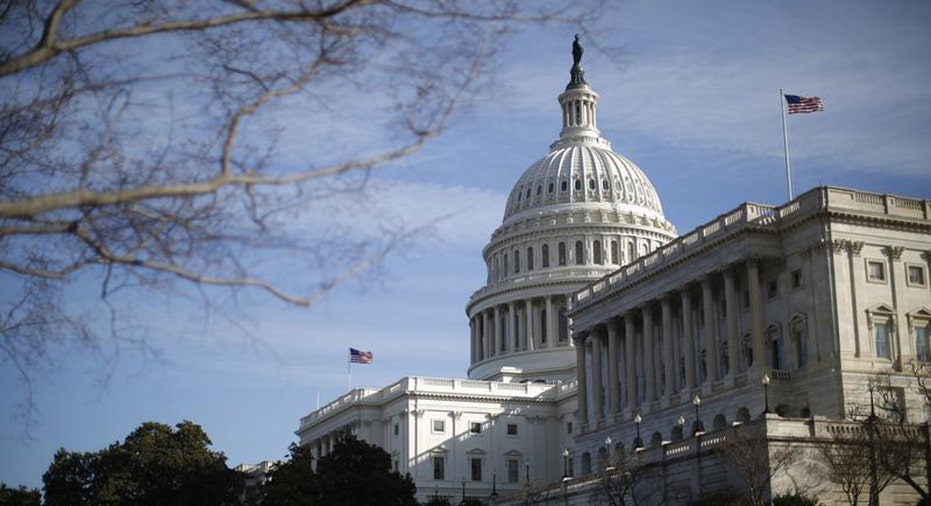Wall Street braces for debt-ceiling showdown

Wall Street is getting worried about the debt-ceiling debate in Washington.
Bond traders, concerned about protracted sparring over the federal government's borrowing limit, are pushing up the yields on short-term Treasurys. The three-month yield, the shortest-term of the U.S. government debt offerings to mature after the upcoming debt-ceiling deadline, now pays more than a note whose term is twice as long. It's a rare "inversion" that hasn't happened in this corner of the market since the throes of the financial crisis.
A brief default on government debt would hit short-term T-bills first, so they've typically turned volatile ahead of deadlines in Washington for lifting the government's cap on borrowing. But the magnitude and timing of the moves -- well before October, the Congressional Budget Office's estimated deadline for a deal -- suggest investors are on edge about what's to come.
"We are all attuned to the dysfunction in Washington," said Priya Misra, the head of Global Rates Strategy at TD Securities in New York. "It's making an early resolution seem very unlikely. Even though the Republicans control the House, Senate and White House, it's not a unified party per se, and that's what creates the risk of a policy mistake."
To be sure, analysts say yields in the $1.7 trillion T-bill market can become jumbled up for reasons besides a debt debacle, such as when the Federal Reserve is in a cycle of lifting rates, as is currently taking place. When rates are rising, pushing up short-term yields relative to their longer-term counterparts, they are already more disposed to become inverted. But this is the first time these yields have inverted on a closing basis since the central bank began lifting rates in late 2015.
Plus, three-month T-bills yields are trading cheaper than they usually do relative to overnight index swaps, an interest-rate derivative in which investors bet on the Fed's interest-rate policy. That suggests other factors are at play than the outlook for the Fed. T-bills on Monday were cheaper than OIS for the first time since 2009, according to TD Securities.
The debt ceiling debate has become common in recent years, with a particularly contentious debate taking place in 2011. It was followed by a debate in 2013 that also sent short-term yields higher, and another one in 2015. That's led investors to routinely demand more yield on the bills most at-risk if the government were to temporarily stop repaying its debt.
This time around, the debate adds a new dimension because it will force different factions within the Republican party to come to an agreement. And they will also have to reach across the aisle to avoid a filibuster, since the Senate will likely need 60 votes to pass a debt-limit increase.
The Treasury reached its $20 trillion ceiling in March, but has raised cash through a series of extraordinary measures. Now lawmakers have until early-to-mid October to lift the ceiling before cash balances are exhausted, according to the CBO. In the meantime, some market participants expect the Treasury will reduce its issuance of T-bills.
Some investors are doubtful about Congress's ability to smoothly reach an agreement to lift the debt limit, given that Republicans in the Senate have so far not been able to bridge divides on a health-care bill.
Treasury Secretary Steven Mnuchin and White House budget director Mick Mulvaney have offered differing views about how to proceed. Mr. Mnuchin has said he does not want to attach conditions to a bill lifting the debt ceiling while Mr. Mulvaney has long advocated tying it to spending cuts or other legislation. President Donald Trump has said Mr. Mnuchin is the point-person on the matter.
While most expect a debt ceiling deal to be ironed out eventually, some worry about knock-on effects in the meantime. In addition to the remote possibility of a short-term delay in debt payments, a debate that comes down to the wire could impact the Fed's decisions on the timing of interest rate increases. The Fed has penciled in one more increase this year.
On Monday, The Treasury Department auctioned $39 billion of three-month T-Bills at a yield of 1.18%, higher than where the market was trading at the time, analysts said. That's another sign investors are demanding more yield to own three-month T-bills.



















